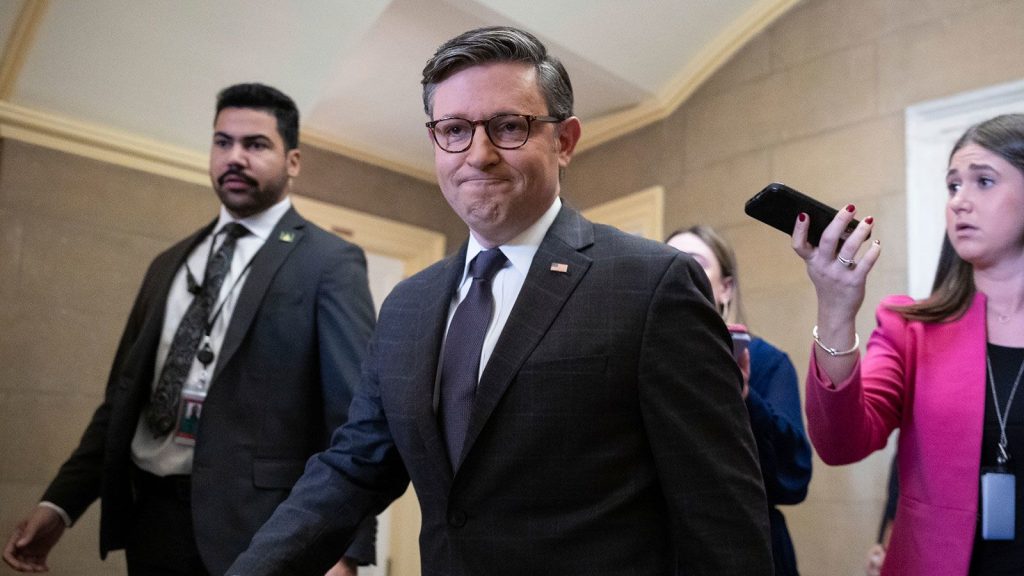By Clare Foran and Haley Talbot, CNN
(CNN) — The US House passed a stopgap bill on Tuesday to keep the government open, putting Congress on a path to avert a shutdown and setting the stage for a broader funding fight in the new year.
The Senate will next need to approve the measure. Government funding is currently set to expire at the end of the week on Friday, November 17.
In the first major test of his leadership, newly elected House Speaker Mike Johnson is pursuing an unusual two-step plan that would set up two new shutdown deadlines in January and February.
The bill would extend funding until January 19 for priorities including military construction, veterans’ affairs, transportation, housing and the Energy Department. The rest of the government – anything not covered by the first step – would be funded until February 2. The proposal does not include additional aid for Israel or Ukraine.
The plan would give lawmakers more time to attempt to negotiate and pass full-year spending bills, though major partisan divisions would make that effort fraught and complicated. Johnson has argued that his plan would prevent Congress from passing a massive spending bill in December – a scenario that has played out many times before when lawmakers have faced a deadline right before the winter holidays.
But the strategy is risky. The short-term funding plan has already resulted in backlash from some conservatives, a dynamic that forced House Republican leaders to turn to Democrats for votes to pass it as the GOP holds only a narrow majority in the chamber.
A number of conservatives oppose the stopgap bill because it would not implement the deep spending cuts they have demanded. Instead, it would extend funding at current levels. As a result, the bill required Democratic support to pass the House.
House Democratic leadership released a statement ahead of the vote saying they would support the stopgap.
“House Democrats have repeatedly articulated that any continuing resolution must be set at the fiscal year 2023 spending level, be devoid of harmful cuts and free of extreme right-wing policy riders. The continuing resolution before the House today meets that criteria and we will support it,” the joint statement from House Democratic leader Hakeem Jeffries and other top House Democratic leaders said.
Former House Speaker Kevin McCarthy was ousted after putting a stopgap bill on the House floor at the end of September. The move averted a shutdown but sparked a conservative revolt against McCarthy that led to his removal as speaker.
Despite the opposition within their ranks, many House Republicans are signaling that Johnson will be spared the same fate as McCarthy. Even the more conservative House Republicans who are opposed to the new stopgap bill – and who voted to oust McCarthy – are willing to spare Johnson their ire.
“He’s had two weeks to pass it. His predecessor had had since January, and then he jammed us up against the September 30 deadline,” said GOP Rep. Tim Burchett of Tennessee. “I’ll just tell you that Speaker Johnson hasn’t lied to me. That’s a good thing.”
Johnson defended his approach to avert a government shutdown and insisted his handling of the situation differs from McCarthy.
“Kevin was in a very difficult situation when that happened,” Johnson told CNN’s Manu Raju. “This is a different situation, the innovation that we created, this new vehicle that the Democrats initially said was so frightening, actually turns out to be something that will change the way we do this.”
“This is a very different situation,” he repeated.
“We’re not surrendering, we’re fighting, but you have to be wise about choosing the fights,” Johnson continued.
He added, “Look, it took decades to get into this mess, right? I’ve been at the job less than three weeks, right? I can’t change, I can’t turn an aircraft carrier overnight.”
Johnson vowed, however, that he is “done with short-term” stopgap bills, a big promise that will set up a nasty fight down the line.
In a sign of continuing tensions in the aftermath of McCarthy’s ouster, Burchett accused McCarthy of elbowing him in the back Tuesday morning while he was talking to a reporter after the party’s conference meeting.
McCarthy denied the incident to CNN’s Melanie Zanona and said, “I didn’t shove or elbow him. It’s a tight hallway.”
This story and headline have been updated with additional developments.
CNN’s Kristin Wilson, Annie Grayer and Lauren Fox contributed to this report.
The-CNN-Wire
™ & © 2023 Cable News Network, Inc., a Warner Bros. Discovery Company. All rights reserved.






More Stories
Plans to ramp up rice production
PM Mottley: Private developers not delivering
Solutions in progress